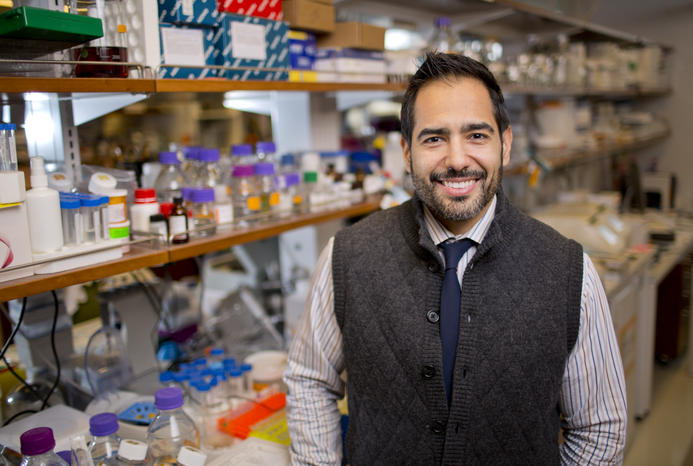Dr. Marcus D. Goncalves, the Ralph L. Nachman, M.D. Research Scholar and an assistant professor of medicine in the Division of Endocrinology, Diabetes and Metabolism at Weill Cornell Medicine, has been elected as a member of the American Society for Clinical Investigation (ASCI) for 2024.
The ASCI is one of the nation’s oldest nonprofit medical honor societies and focuses on the unique role of physician-scientists in research, clinical care and medical education. It is comprised of more than 3,000 physician-scientists representing all medical specialties in the upper ranks. ASCI members are leaders in their fields in translating laboratory findings into clinical advancements. Dr. Goncalves is among 100 new members elected this year and will be officially inducted at the organization’s annual meeting in April.
“It’s a high honor for me to be included in this group,” said Dr. Goncalves, who is also an assistant professor of biochemistry at Weill Cornell Medicine. “I’m very grateful to the selection committee and the people who nominated me because ASCI membership represents a significant milestone in my career and has been a dream of mine ever since I was an MD-PhD student.”
Dr. Goncalves’ clinical research encompasses the intersection between endocrinology and cancer biology, with his lab focusing on the effects of diet and cancer on the host tissues that regulate systemic nutrient metabolism. “We investigate how cancer impacts systemic metabolism and, on the contrary, how systemic hormones and metabolites can promote or slow tumor growth,” he said.
A particular focus of Dr. Goncalves’ research is cachexia, a debilitating wasting syndrome that involves muscle and fat loss and often occurs in people with advanced cancer. He is co-leader of the Cancer Cachexia Action Network (CANCAN), which was established in 2022 and funded through a Cancer Grand Challenges award from the National Cancer Institute and Cancer Research UK, and seeks to explore the underlying mechanisms of cachexia in cancer. The team consists of clinicians, patient advocates and scientists with expertise in cancer, metabolism, immunology and more from 14 institutions across the United States and the U.K.
“With cachexia, some people may lose weight because they’re not eating. Others, with high metabolism, may lose weight despite eating more than they need,” Dr. Goncalves said. In either case, weight loss from cachexia increases the risk of death and leads to poor outcomes in terms of treatment response. “There’s no known mechanism for why cachexia develops or how to treat it,” he said. “My goal and our research team’s goal is to try and identify the different subtypes of people who are experiencing cancer-related weight loss and develop targeted treatments for the condition.”
Election into the ASCI, which is based on outstanding scholarly achievement, will provide Dr. Goncalves with the opportunity to engage with other physician-scientists who are conducting innovative research in a variety of medical specialties. “It’s an honor to be elected to the ASCI at this stage of my career,” he said, “and it validates the work we’ve been doing.”

